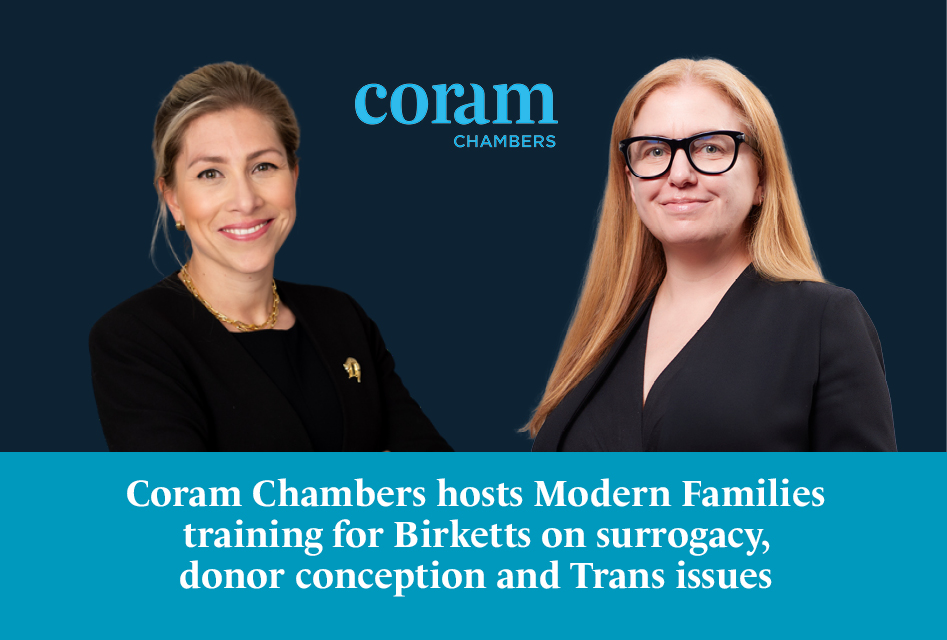Coram Chambers is proudly supporting Family Mediation Week (16-20 Jan) to raise awareness of mediation and how it can help separating families.
Within the Coram mediation team we aim to provide the best outcomes for our clients whilst avoiding the expense and time consuming nature of standard legal proceedings. Our qualified family law mediators take on cases in civil, commercial, employment and family disputes and have undertaken Bar Council approved training and are on the Bar Council list of approved mediators. Several members within the mediation team also hold part time-judicial appointments.
We are able to offer our mediation suite for sessions requiring anything from one to five private rooms. We have five state of the art conference rooms that vary in capacity from four to twenty, comprising our seminar and mediation suites. To view our facilities, please click here.
Jacqueline Marks, the joint head of our ADR practice group, shares her top tips when preparing your clients for a joint mediation.
Going to mediation is less expensive than a court-based solution for family disputes, but it is still an investment of time, money, and emotion in trying to reach a sustainable outcome.
It is important for your clients to think carefully beforehand about how to get the best out of each session and give themselves the best possible chance of finding a solution to the issues that bring them to mediation.
TIP ONE
Mediation can help to create a new way of communicating. Often participants have not spoken directly to each other for months, if not years, and they need to work out how to talk to one another again. It may be helpful to advise your clients to listen to one another so that they can hear what the other person is saying. They may have heard most of what is said before but it maybe something that is new to them or an acknowledgement of something that they find helpful, and which will enable them both to find some space to move on.
TIP TWO
Your clients need to arm themselves with knowledge before they come to the session. This might mean looking at all the documents that have been disclosed, looking at some parenting websites or consulting their lawyer. It might just be thinking about what is important to them and what they want to achieve. Just being an observer rather than focussing on outcomes and solutions may lead to disappointment and a high chance of the mediation breaking down
TIP THREE
Focussing on and facing up to financial reality and thinking about a future separate from their partner can feel very scary. Your clients need to be able to cope with uncertainty. This is not an obvious one, but until the last mediation session it is probably not possible to see the whole financial landscape and to have a complete picture of what the outcome might be. It is natural to feel anxious over the way in which the mediation is going but sitting with the uncertainty of being able to move forward positively, without knowing all the answers, could free your client to consider outcomes they had not thought about. NB full disclosure is of course important.
TIP FOUR
Children First. This is an obvious one but in all the emotion around the separation and sorting everything out, this can become lost. Very often the hurt your client has experienced does not seem to be heard in a court-based process and this can lead to enduring bitterness and a desire to keep punishing their former partner. Mediation, especially when therapeutically informed, can enable your client to express some of the hurt and anger in a controlled environment, and can help to create a space to move forward. Focussing on the children’s needs and feelings can move the discussion on in a way that looking at parental rights and entitlements does not. Child Inclusive Mediation can cut through a lot of the issues when the children are heard from directly.
TIP FIVE
Mediation focuses on how to achieve common goals and solutions; this contrasts with a court-based approach when you are giving advice about what is the realistic best possible outcome for an individual client. Advise your client to put themselves in the other person’s shoes. This is difficult to do when a key relationship has broken down. There is a lot of hurt and often mistrust. However, looking at things from the other person’s point of view can enable a middle ground to be found which is one that both of them can then live with, even if it is not ideal. A solution that meets both participant’s needs (if only partly) is likely to be much more sustainable
This blog was written for Family Mediation Week 2023.
Jacqueline Marks is a member of Coram Chambers and she sits as a deputy district judge in the family court. She has trained in psychodynamic psychotherapy and as a mediator. She is also a partner and a founding member of The Mediation Space LLP, a specialist mediation service run by mediators who are all experienced family lawyers and have training in psychotherapy. They offer therapeutic support in the mediation process. They also offer Child Inclusive Mediation and the MOJ Voucher scheme. If you want any more information about their service or to make an enquiry please email them here.


